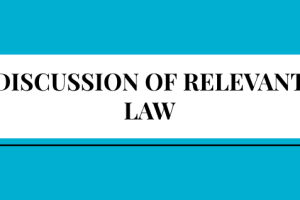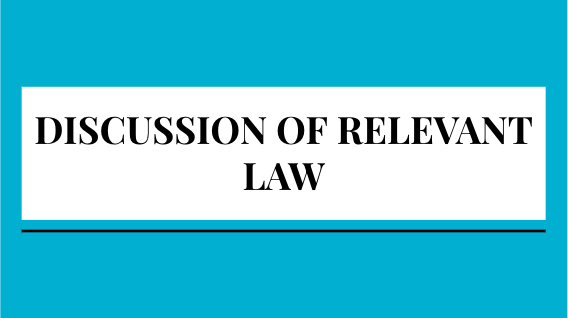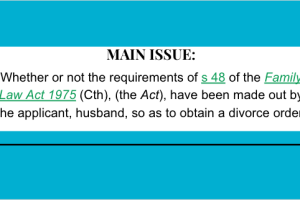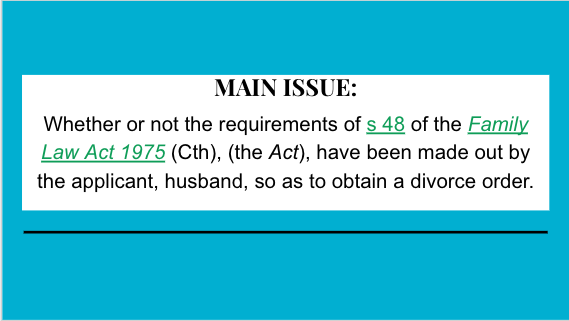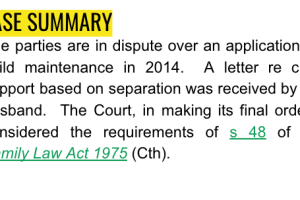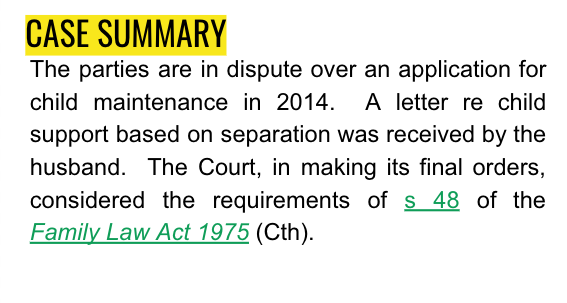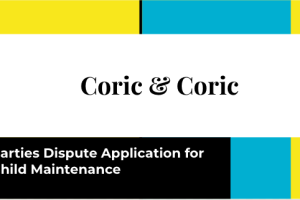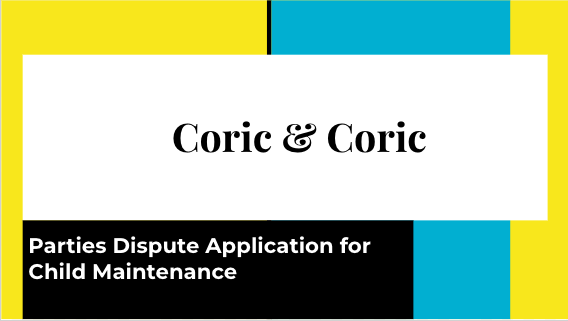- · 4784 friends
Husband and Wife Battle Over Child Maintenance Dispute

Coric & Coric [2022] FedCFamC2F 1377 (11 November 2022)
The parties are in dispute over an application for child maintenance in 2014. A letter re child support based on separation was received by the husband. The Court, in making its final orders, considered the requirements of s 48 of the Family Law Act 1975 (Cth).

Facts
The application for divorce was filed on 22 October 2021 and based on a date of separation as being 5 May 2014 albeit the parties continued to live in the same house. That date was founded upon an alleged letter from the Child Support Agency (“the Agency”) dated 5 May 2014 and that being the date on which the respondent, wife, identified the parties as having separated in the application for child support for the youngest child. The applicant treated the marriage as over as at the date of the alleged separation in that application for child support by the respondent. The response to the application was filed on 3 May 2022.
The respondent alleged the matrimonial relationship continued until 15 September 2021. In 1989, the parties were married within the former Country B now known as Country C. The parties have three children, the youngest of which was born in 2003, being Mr D, and the child support application of 2014 related to him. Mr D’s sister; Ms E, was born in 1990 and his sister Ms F was born in 1997, so they were adults at the time of the child support application.
There has also been filed a further amended initiating application identifying that the applicant seeks relief under s 79 of the Act in relation to a property division. The property issue is not currently before this Court. The applicant’s evidence was that in 2014 he became aware of a letter from the Agency that advised that an assessment had been made requiring the applicant to pay child support and that in the application for child support the respondent had alleged a date of separation being 5 May 2014. The applicant identified that he acted upon that date in the realisation that the respondent had formed an intention to separate, although he believed the marriage had already broken down.
The applicant identified that he had misled the earlier correspondence from the Agency and no letter dated 5 May 2014 or the application for child support were put into evidence. The applicant also identified he acted upon the intention of the respondent disclosed in a letter dated 15 September 2014 received by him which referred to the parties as having separated. That letter dated 15 September 2014 enclosed a child support assessment which had full details of the assessment for the period of 22 August 2014 until 21 November 2015 and required the child support to be paid directly to the respondent. The letter dated 15 September 2014 referred in its opening to separated parents being able to apply to the Agency for child support.
The letter dated 15 September 2014 is addressed to the applicant at a particular PO Box at Suburb O NSW. The letter was entitled “Child Support Assessment Application Acceptance”. The letter dated 15 September 2014 identified that the Agency was writing to advise they had accepted a child support application from the respondent. The letter identified having undertaken a calculation of the child support to be paid and included the said assessment for the period from 22 August 2014 to 21 November 2015.
The applicant maintained in respect of the alleged separation that although they resided under the same roof, they did not live together as husband and wife. The applicant also referred to the relationship as having broken down in 2005 when the respondent left Australia to travel to Country H.

Issue
Whether or not the requirements of s 48 of the Family Law Act 1975 (Cth), (the Act), have been made out by the applicant, husband, so as to obtain a divorce order.

Applicable law
Family Law Act 1975 (Cth) s 48 - provides that an application under this Act for a divorce order in relation to a marriage shall be based on the ground that the marriage has broken down irretrievably.
Analysis
The applicant identified a document he could not produce, and also the Agency letter dated 15 September 2014 that he did produce. The applicant was not cross-examined to challenge the receipt and notice of the content of the Agency letter dated 15 September 2014 that conveyed the respondent’s intention to separate. More materially the respondent did not offer any explanation in her affidavit evidence in chief concerning the application for child support or the Agency letter dated 15 September 2014. The respondent, in that regard, was on notice of the Agency letter 15 September 2014, its content as to the parties having been a separated, her knowledge as to child support depending on separation, her knowledge or explanation as to the sending Agency 15 September 2014, her knowledge of its receipt by the applicant and had the opportunity to identify acts of alleged reconciliation after the receipt of that letter.
The application for child support must have identified a date of separation and the Court is satisfied that although the application may have been earlier completed there is an express intention to convey the fact of separation by the respondent acted upon, authorised and communicated by the respondent through the letter dated 15 September 2014 to the applicant. The cross examination on behalf of the respondent adopted a broad reference to 2014 and there is no unfairness in this case in treating the relevant date of separation as being 15 September 2014, rather than 5 May 2014. The respondent asserted that their intimate relations continued after the application for child support. The respondent was not an impressive witness as she repeatedly sought to advocate her cause beyond a responsive answer, even after direction by the Court not to do so. There were no evidentiary particulars or detail given by the respondent in respect of alleged continuing intimacy between the applicant and the respondent after the making of the child support application.
Conclusion
There is an order for divorce of the parties to the marriage pursuant to s 48 of the Family Law Act 1975 (Cth). It is satisfied that there are no children who have not attained 18 years of age.


